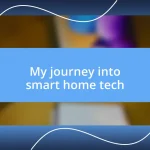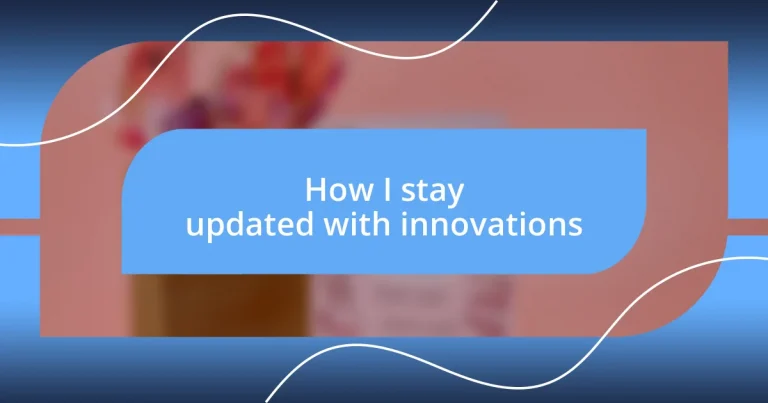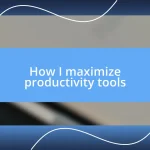Key takeaways:
- Innovation drives productivity and resilience, enabling teams to adapt and thrive in challenging environments.
- Reliably assessing information sources is crucial; key factors include credibility, author expertise, citations, bias, and recency.
- Engagement in professional networks and continuous application of knowledge through learning events fosters collaboration and enhances skills.
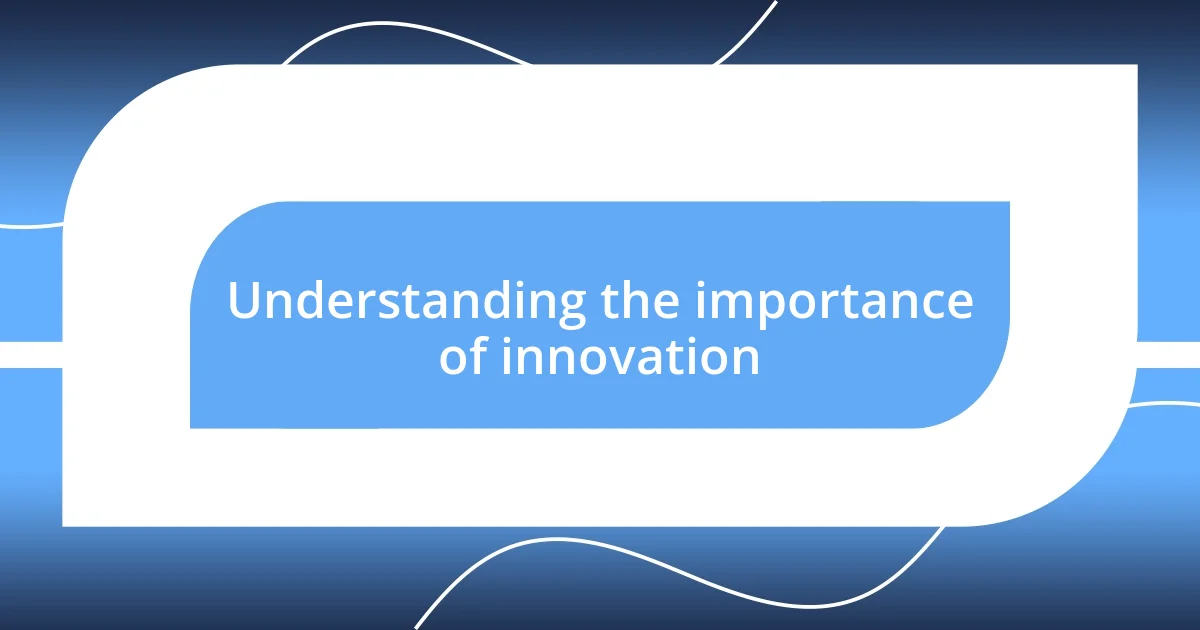
Understanding the importance of innovation
Innovation is more than just a buzzword; it’s the lifeblood of progress. I remember when I first adapted to new technology at work—initially, I was overwhelmed, but once I embraced the changes, I watched how it transformed our productivity and creativity. If we don’t stay ahead of the curve, how can we expect to compete in an ever-evolving landscape?
Consider this: every breakthrough we see today is built on someone’s imaginative leap. I often think back to a project where my team introduced a fresh approach to problem-solving. The excitement in the room was palpable! It reinforced for me just how pivotal innovation is in inspiring collaboration and driving results.
Ultimately, innovation fosters resilience. During challenging times, I’ve found that those who are willing to rethink and adapt often emerge stronger. Isn’t it fascinating how a single idea can spark a revolution? Embracing innovation not only prepares us for the unknown but also allows us to shape the future actively.
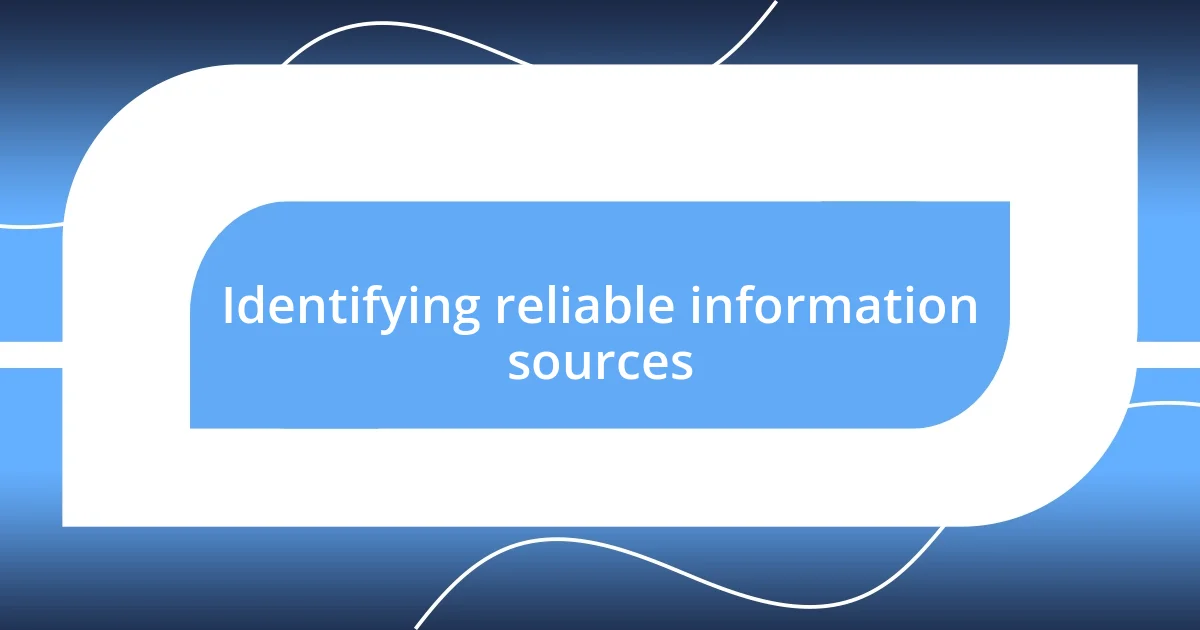
Identifying reliable information sources
When it comes to identifying reliable information sources, I’ve learned to trust my instincts but also rely on a set of criteria. I look for established platforms or experts renowned in a particular field. For example, I often turn to scholarly articles or reputable news outlets. I recall a time when I stumbled across a supposed “expert opinion” on social media that turned out to be misinformation. That experience taught me the importance of verifying my sources before accepting information as truth.
Here are some key factors I consider when assessing the reliability of information sources:
– Credibility: Is the source known for accuracy and trustworthiness?
– Author Expertise: Does the author have qualifications or experience in the topic they are discussing?
– Citations and References: Are claims backed by evidence and references from reputable studies or data?
– Bias: Does the source present information fairly, or does it have an agenda?
– Recency: How current is the information? In rapidly changing fields, older information may no longer be relevant.
By consistently applying these criteria, I feel more confident in the information I consume and share.
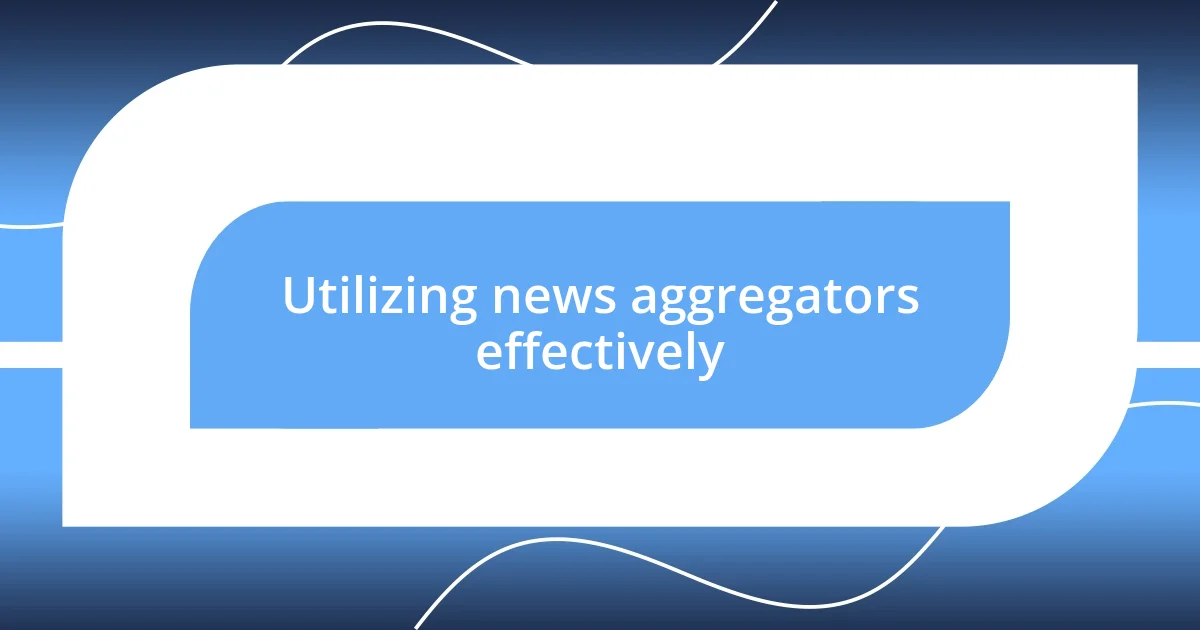
Utilizing news aggregators effectively
Utilizing news aggregators can be a game-changer for staying informed. I remember my first experience with using an aggregator; it was like finding a treasure chest of information. Instead of wasting time jumping from site to site, I found articles tailored to my interests—all in one place! This streamlined approach makes it easier than ever to stay on top of innovations relevant to my field.
It’s essential to customize your news aggregator settings to amplify your experience. By selecting specific topics or keywords, I’ve discovered niche areas of interest that I would have otherwise missed. For example, last month, I turned on alerts for fintech developments, which led me to an insightful article about blockchain applications in healthcare. How amazing is that? With the right adjustments, news aggregators can serve as personal research assistants, making the task of staying informed feel effortless and exciting.
Using aggregators also helps filter out noise from irrelevant content. Initially, I found myself overwhelmed by the sheer volume of information available. However, by leveraging features such as bookmarks and categorization, I could save articles for deeper reading later. This organized approach transformed my information consumption from chaotic to manageable, allowing me to focus on what truly matters.
| News Aggregators | Features |
|---|---|
| Feedly | Customizable categories, saves articles |
| Inoreader | Offline reading, keyboard shortcuts |
| Visual layout, topic discovery | |
| NewsBlur | Social sharing, reading training |
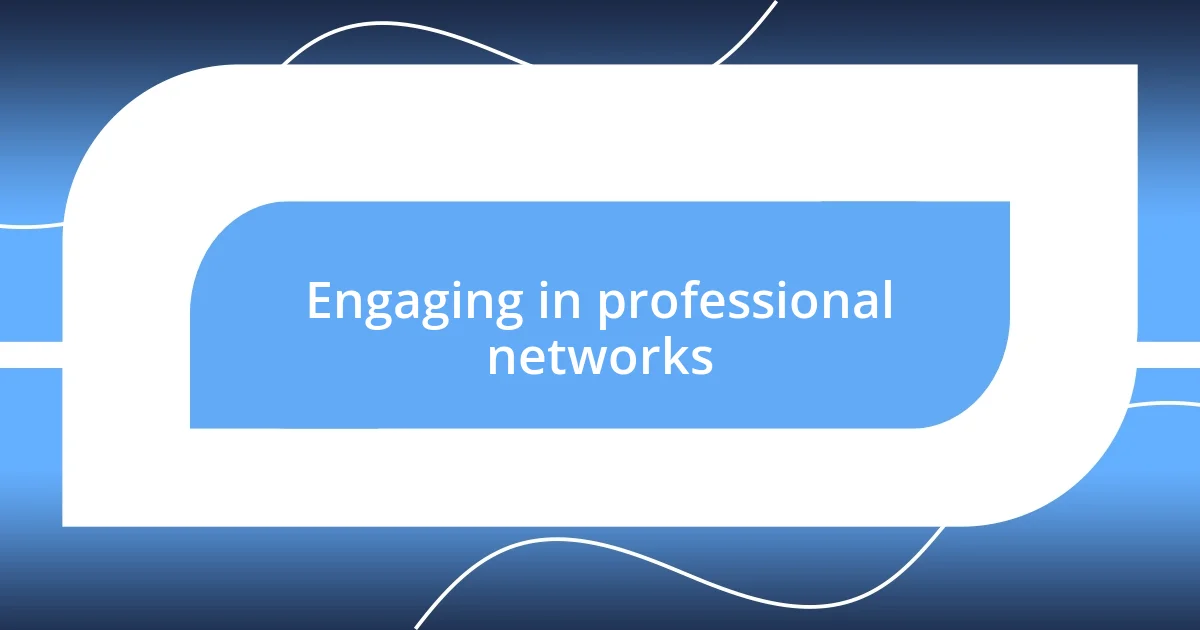
Engaging in professional networks
Engaging in professional networks has been one of the most valuable strategies for keeping up with innovations. I remember attending a virtual conference last year and was pleasantly surprised by how energized I felt after interacting with industry leaders. They shared the latest advancements in technology, sparking ideas I hadn’t considered before. Isn’t it invigorating to be surrounded by like-minded individuals who are equally passionate about pushing boundaries?
Additionally, I actively participate in online forums and LinkedIn groups specific to my field. These platforms have allowed me to seek advice and gain insights from peers facing similar challenges. A recent discussion on emerging marketing trends led me to a resource I had never encountered before. I can’t help but feel that these exchanges not only enhance my knowledge but also create a sense of community that’s hard to replicate elsewhere.
Getting involved in professional associations has also made a significant difference in my understanding of industry shifts. I joined a local chapter that holds regular meetups, and the connections I’ve made there have become invaluable. One memorable evening, a fellow member shared insights about sustainable practices altering our industry landscape. It opened my eyes not just to new concepts but also to potential collaborations. How often do we overlook the power of collective knowledge? In my experience, these interactions form the backbone of staying updated and motivated in a rapidly changing world.
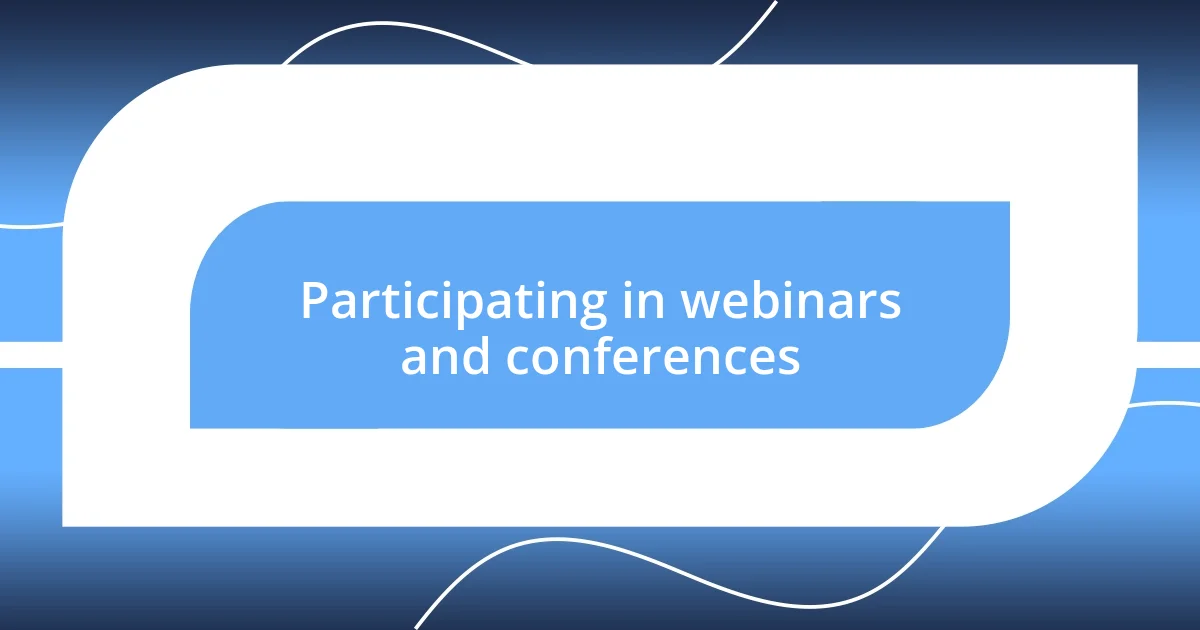
Participating in webinars and conferences
Participating in webinars and conferences has become a cornerstone of my learning journey. I vividly recall attending a digital marketing summit where speakers shared cutting-edge strategies that seemed like a glimpse into the future. The energy in the virtual room was palpable, and I left with not just knowledge but also a renewed passion for my work. Isn’t it amazing how a single event can spark a flurry of creative ideas and connections?
I’ve found that engaging with experts during these sessions amplifies my understanding. After a recent webinar on artificial intelligence, I eagerly jumped into the Q&A session and asked about its implications for small businesses. The responses were not only enlightening, but they also opened up a dialogue that led to ongoing discussions with other attendees. Sharing insights and asking questions in real-time makes it feel less like a lecture and more like a collaborative exploration of ideas—something that truly enriches the experience.
Moreover, attending conferences often offers unexpected opportunities for networking that can be transformational. During a recent industry meetup, I struck up a conversation with someone who is now a mentor of mine. Over coffee, we explored innovative approaches to project management that I had never considered before. Those informal interactions have a way of yielding insights that formal sessions sometimes miss. Have you ever had a chat that changed your perspective entirely? I certainly have, and it’s moments like these that make participation in such events priceless.
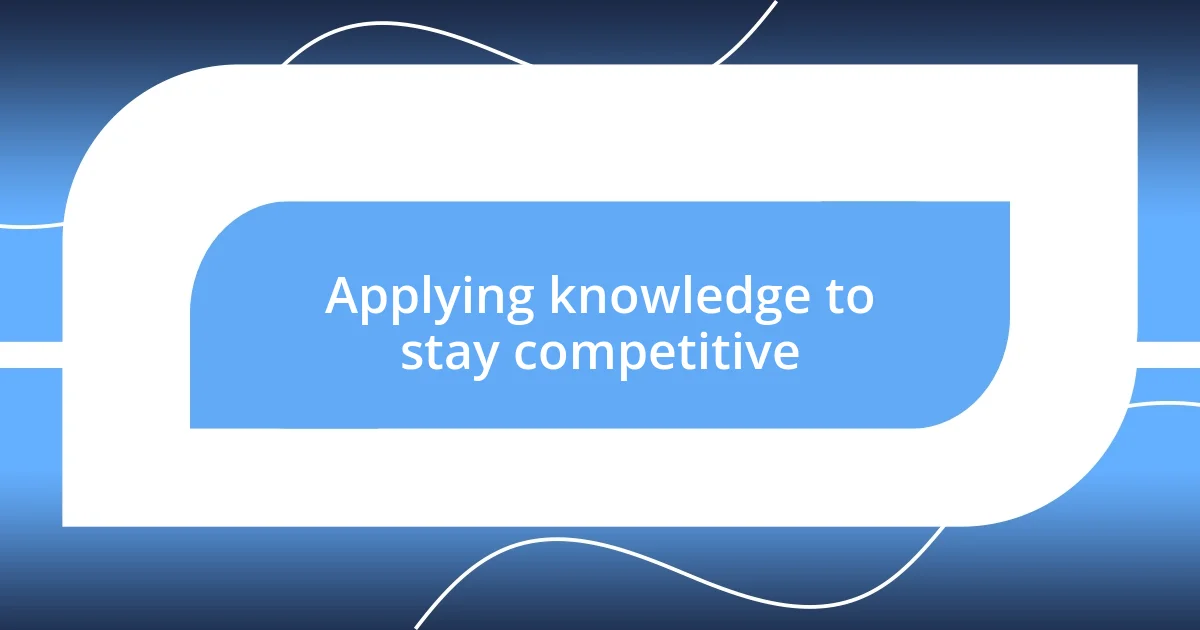
Applying knowledge to stay competitive
Applying knowledge effectively is crucial for maintaining a competitive edge in any field. I remember a time when I took a deep dive into a new software tool that promised to streamline project management. The first few weeks were challenging, but as I persisted, I began to unlock its potential, ultimately transforming my workflow. Isn’t it fascinating how dedicating time to learn a single tool can lead to significant productivity gains?
I also believe in the power of continuous learning. A recent online course I completed on data analytics illuminated aspects of my work that I had previously overlooked. I was astonished by how understanding the data behind customer behavior could change my marketing approach entirely. It’s moments like these—when a new piece of knowledge clicks—that remind me why applying what I learn is so vital for staying ahead. Have you ever experienced an “aha” moment that reshaped your perspective?
Moreover, I frequently implement what I learn in real-time projects, which reinforces my understanding and fosters innovation. When I was tasked with revamping a campaign, I integrated new strategies I had encountered through various resources. The positive feedback we received from our audience confirmed that these innovations had a real impact. This cycle of learning, applying, and assessing is what keeps my skills sharp and my work relevant in a fast-paced industry. How do you challenge yourself to turn knowledge into action?









